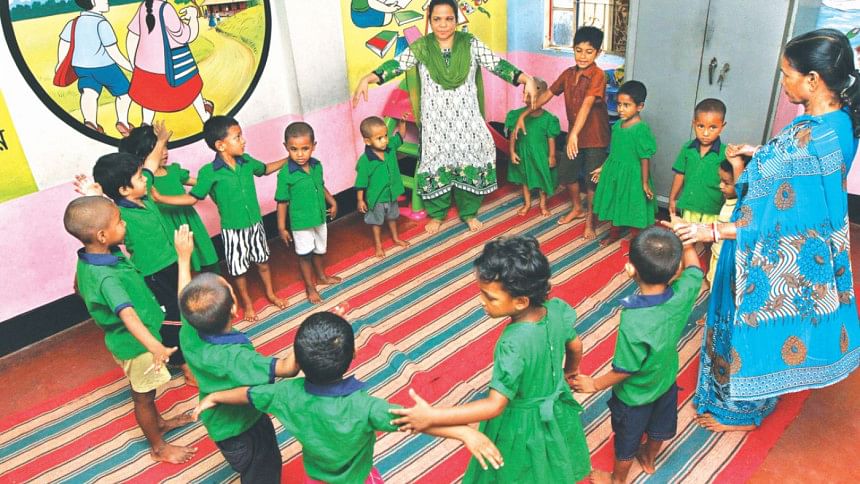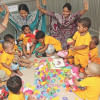Coming back to life

The three-room flat in the capital's Paltan falls silent only when the children leave this home every afternoon to return to where they come from -- the streets. Until then it is where they sing, cry, laugh, play, fight and cuddle -- to build memories of childhood and learn to dream big.
Even at this early age, these street children are exposed to a cruel, ugly face of the world instead of growing up happily within the arms of their parents.
This centre and another at Bangabazar have been working for more than eight years to elevate the status of the homeless and undo at least some of the damage poverty caused to their mental and physical health.
Caring for children during the day is a great way to initiate change in their lives when fathers and mothers toil away to make ends meet.
At the centre, the children, aged between one and six years, spend their best time of the day with the caregivers. A recent visit to their Paltan home made it clear how little they need to be happy.
As the doorbell rang, three to four children with curious eyes came to see who were at the door. They were prompt to greet, saying “good morning”.
Inside, some of the children were still having breakfast. Within minutes, they washed their hands and sat in a circle to listen to Smriti Kona Biswas, their teacher whom they fondly call “didi” (elder sister).
As Smriti began singing rhymes accompanied by gestures, the kids joined her. One rhyme done, they shouted out another rhyme or song to be sung. Younger ones within age two were happy enjoying the show.
Smriti said they accepted children as young as one year old.
Rights organisation Nari Maitree, with financial support from Concern Worldwide, Bangladesh, runs this centre and also the one at Bangabazar.
Thirty children receive informal education at a time until they turn six. Then Smriti communicates with nearby public schools or private schools, in case there is no government school, for their admission.
Even after children are enrolled in primary schools, the staff of the centre remain in constant touch with them, and provide them with necessary assistance as well as make sure they don't drop out.
Anamika is among the 123 children who have continued formal education with support from Nari Maitree.
Now in class eight, she explained how her and her two siblings' lives changed since her mother Mukta Begum got in touch with the NGO in 2008.
Mukta's husband had died by then of drug abuse. She was struggling to meet the expenses working sometimes as a house help, sometimes as a day labourer. The centre then began looking after the needs of her children during the day. At night the mother slept with her children on the verandah of people's homes.
As Mukta's two girls grew up and a relationship of trust built between her and the NGO staff, the organisation gave her Tk 5,000 in cash assistance to do business.
When Mukta, now 35, saw a rise in income from her business of selling betel leaves and cigarettes, she rented a small room on the rooftop of a building. That was how she joined 357 others who found a home with help from the NGO under the project, “Amrao Manush”.
The project expired last year. This year it has been replaced by a project named “Improving the Lives of Urban Extreme Poor (ILUEP)” including the poorest of slum dwellers as target people, said Project Coordinator Shamim Ara Shammi.
Dhaka city has nearly 30,000 floating people as estimated by the Centre for Urban Studies. Of them, Nari Maitree is giving support to some 3,000 pavement dwellers in one way or the other.
Under the new project, the NGO would continue its work in other areas like ensuring birth registration of homeless people and issuance of national identity cards to them. It was the first to convince the authorities into relaxing rules that require home address for getting NID cards and birth certificates for the street people linked with NGOs. For these people, the NGOs' addresses will be their addresses.
The project design also features vocational training for males and females and establishing a line of communication with employers so that they find jobs.
Above all these, Shammi said, “Building awareness among street people is the most important job to make lasting impacts on their lives -- making them realise how to live a healthy life, why they should save and why they should be responsible parents.”
As she was speaking, children were heard singing, “We shall overcome, we shall overcome someday….”
Smiles on their faces and light in their eyes spoke of their winning the battle in life already. But they will need help from the society to grow up as good human beings.

 For all latest news, follow The Daily Star's Google News channel.
For all latest news, follow The Daily Star's Google News channel. 








Comments